Iranian Writer Summoned To Intimidate, Silence His Wife: PEN America
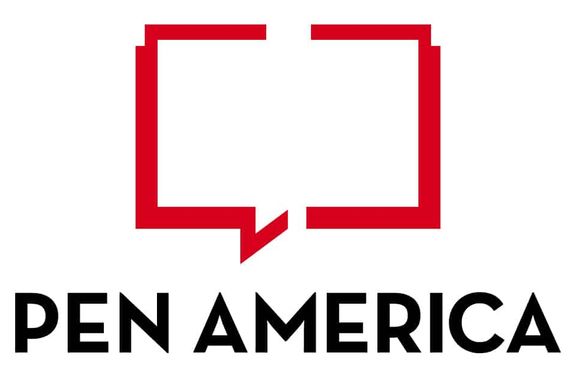
Pen America has condemned summoning Reza Khandan, the husband of a prominent Iranian human rights lawyer Nasrin Sotoudeh.

Pen America has condemned summoning Reza Khandan, the husband of a prominent Iranian human rights lawyer Nasrin Sotoudeh.
PEN America, founded in 1922 and headquartered in New York City, is a nonprofit organization that works to defend and celebrate free expression in the United States and worldwide through the advancement of literature and human rights.
Karin Deutsch Karlekar, director of PEN America’s Expression at Risk programs, released a statement Tuesday saying Khandan’s summoning is another attempt to intimidate and silence Sotoudeh.
“The summons recently issued to Reza Khandan, which will pull him away from his family and into Iran’s notorious and overcrowded prisons, is an outrage,” reads the statement.
“For more than a decade, his wife Nasrin Sotoudeh has been a leading voice of conscience in Iran, working, writing, and speaking out against injustice and in support of fundamental human rights and the rule of law,” added Karlekar.
Kalekar also called for a review and cancellation of Khandan’s sentence.
Khandan was summoned February 13by the judiciary to serve his prison term. He was sentenced to six years in jail in 2019, along with Farhad Meysami, a doctor and civil activist, but the implementation of his sentence was postponed.
He was summoned a few days after his wife's interview with the CNN about Iran's protests.
In this interview, Nasrin Sotoudeh emphasized that despite government repressions, the people of Iran still want a referendum and a regime change.
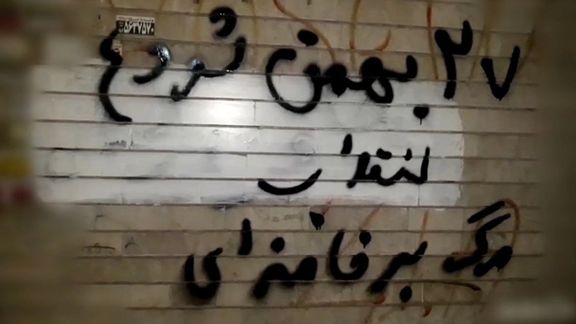
Despite many parts of Iran being covered in snow, people continue to write slogans on walls and distribute flyers and posters calling for fresh protests.
They call for protests planned for February 16, which marks the 40th day after the execution of Mohammad-Mehdi Karami and Mohammad Hosseini, two of the four Iranians who were hanged for their participation in antigovernment rallies.
The 40th day of a loved one’s death – as well as the seventh day -- carries immense cultural significance in Iran, and in case of an unjust killing, such as the young protesters killed by security agents, the occasion turns into public mourning and fuels angry protests.
Graffiti on walls and fliers proclaim, "Start of the revolution."
Karami and Hosseini had been arrested in the city of Karaj during demonstrations om the 40th day of another victim, Hadis Najafi. Holding such events is reminiscent of a similar turn of events 44 years ago, during the Islamic revolution against monarchy that culminated in the overthrow of the Pahlavi dynasty under Shah Mohammad Reza Pahlavi, and the establishment of the Islamic Republic in 1979. Marking the 40th day for people who were killed during the revolution turned into fresh protests that fueled the movement.
A young woman without veil writes, "Death to Khamenei"
Following more than five months of protests, numerous calls made by Iranian politicians from across the spectrum to do away with violent crackdown, finally prompted the government to reluctantly announce a partial amnesty for jailed protesters and promises to release more prisoners including intellectuals.
But February 16 will be the day the regime shows its true colors to the world again.
Young grassroot activists in Tehran -- calling themselves Youths of Tehran’s Neighborhood (Javanan-e Tehran) -- that have mobilized thousands of protesters in several towns and cities during the current unrest, have called on people to gather at main streets and squares of their cities in the evening. "The child-killing regime of the Islamic Republic will soon come to an end and all together we will turn this shameful page of our history," read their statement.
The voice in this video says all Qasem Soleimani murals have been defaced
Many videos from several cities have surfaced on social media showing people having written the date, February 16, on walls and vowing “the start of the revolution.” The Islamic Republic, pretending that the situation is back to normal, is pushing singers and celebrities to hold events that were almost nonexistent during the past five months. But people use the events, such as a concert by Sirvan Khosravi recently, to chant antigovernment slogans and the main motto of the uprising: Women, Life, Freedom.
In addition to nationwide protests, Iranian diaspora communities have also planned another protest rally for February 20 outside the European Parliament in the Belgian capital Brussels. The gathering is meant to call on the European Union countries to designate the Revolutionary Guard – or the IRGC – as a terrorist organization. Thousands of Iranians from all over Europe held a massive rally in Strasbourg in January to pressure the European countries to list the IRGC.
Iranians staged mass rallies in dozens of cities across the world calling for the overthrow of the Islamic Republic on Saturday [February 11], concurrent with the regime-sponsored events inside Iran to mark the 44th anniversary of the Islamic Republic in 1979.
In their historic joint event in Washington on the eve of the rallies on February 10, eight prominent opposition figures held a joint forum, signaling the emergence of a leadership council in the diaspora to campaign for international support in favor of Iran’s protest movement. They also called for support from democratic countries to change the regime in Iran and establish democracy.
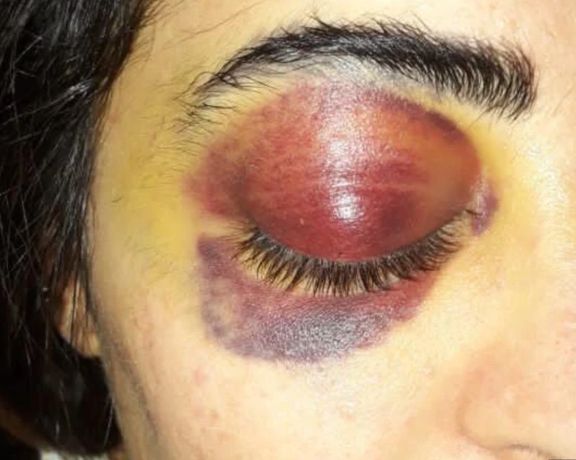
A young protester says a Revolutionary Court in Iran has sentenced her to 11 years in prison and 124 hours of "washing graves".
Mina Yaqoubi, a 33-year-old bodybuilding trainer from the city of Arak, said in a video Monday that “I was tortured and interrogated 12 hours a day, and now I have been sentenced to 11 years behind bars, 124 hours of grave cleaning, 85 lashes, and two years of exile.”
The Arak judiciary had previously announced she was arrested on a charge of "throwing rocks at martyrs graves".
On December 1, a video of Mina Yaqoubi on social media showed her being released from prison on bail, but what caught everyone's attention was her weak body and bruised eyes suggesting she was tortured in prison.
Following the controversy caused by the video, the judiciary claimed in an announcement "Due to some previous mental and emotional problems during the detention, she attempted suicide twice. She jumped off the second floor of the women’s ward, but with the vigilance of the caregivers, she suffered minor injuries such as bruises on her face."
However, Yaqoubi rejected the narrative of the judiciary saying she kept her silence for almost three months to see if there would be any reduction in punishment, but her final verdict is now issued.
The Islamic Republic showed an iron fist during the nationwide protests following the death of Mahsa Amini in mid-September killing more than 500 protesters and detaining tens of thousands of other protesters.

Calls for mass protests on February 20 is gaining momentum outside Iran with several key figures are asking compatriots to stage anti-regime protests.
Alireza Akhundi and Darya Safai, two representatives of Iranian origin in the parliaments of Sweden and Belgium called on Iranians to gather in front of the European Council building in Brussels Monday and support the inclusion of the IRGC in the list of terrorist organizations in the European Union.
Activists Masih Alinejad and Hamed Esmaeilion also welcomed the call saying that they will participate in the February 20 gathering of Iranians in Brussels to support the designation of the IRGC as a terrorist in the European Union.
Meanwhile, people inside Iran chanted anti-government slogans in Karaj, west of Tehran, and different neighborhoods of capital Tehran, as in previous months.
They also distributed flyers to invite people to participate in a protest rally on Thursday.
Thursday marks the 40th day after the execution of Mohammad Hosseini and Mohammad Mehdi Karami.
The two young men, who were arrested during the protests in Karaj, were executed without having access to fair trial and lawyers.
Street protests, gatherings, overnight slogans, writing graffiti and other forms of civil disobedience are still going on inside and outside the country, five months into the uprising against the clerical rulers.
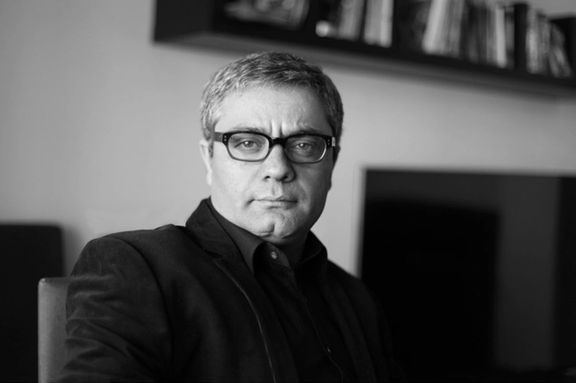
Renowned filmmaker Mohammad Rasoulof who was told not to return to prison from his medical furlough says the end of imprisonment is not the beginning of freedom.
Rasoulof who has been in and out of prison several times in the past few years for his works, was told not to return to prison, apparently as part of a partial amnesty announced earlier this month.
Rasoulof, winner of many prestigious film awards, said in an Instagram post Monday announced his release. “The end of imprisonment is not the beginning of freedom,” he wrote while wishing freedom for many other prisoners of conscience still remaining behind bars.
Several hundred prisoners including protesters, political prisoners and prisoners of conscience, and journalists have been freed since the announcement of Khamenei’s amnesty that authorities said would apply to “tens of thousands of prisoners”. Some of these had nearly served their whole sentence.
Judiciary authorities said that the amnesty would apply to those who “repented” from their supposed crimes and pledged not to repeat the offences.
Some of the those released from prison since then, including Zahra Kashkaki, a student at Tarbiyat Modarres University in Tehran who was arrested for protesting, say they had to sign a pledge. “I signed it. I hate myself,” she tweeted.
Apparently, many others have neither sought to benefit from the amnesty nor signed anything but were freed. Some including activist and Kurdish language teacher Zara Mohammadi even say they were hastily “kicked out” without them, their families, or their lawyers having asked for their freedom.
Human rights organizations, activists and lawyers have criticized Khamenei’s partial amnesty for protesters as a mere attempt at rescuing the image of the regime rather than a real step towards recognition of social and political freedoms and an end to repression.
“The mass amnesty of the prisoners of the Woman, Life, Freedom revolutionary movement on the condition of repenting indicates the continuance of Khamenei’s domineering mentality. It’s an endeavor condemned to defeat for mending his broken authority and fallen image,” US-based activist Ali Afshari tweeted while opining that it could also be a
security measure to prevent possible unrest in prisons where political prisoners are held.
“Amnesty? Detained protesters have done nothing wrong to be pardoned by Khamenei. It is Khamenei and the regime suppressers who must seek the forgiveness of political prisoners, those harmed and the families of those killed in the Woman, Life, Freedom movement protests,” journalist Morteza Kazemian tweeted after the announcement of Khamenei’s amnesty.
Rasoulof who is a Berlin Golden Bear winner, and his colleague Mostafa Al-e Ahmad were arrested in July 2022 after signing an appeal along with tens of other filmmakers and film industry workers. The appeal called on security forces to “lay down” their weapons and urging them to stop suppression of protests in Khuzestan Province fueled by the collapse of a newly built multi-story building in Abadan that killed over forty people.
After the execution of Mohsen Shekari, one of the four protesters the regime has hanged in the past five months, Rasoulof and other political prisoners issued a statement in which they said the execution was proof of the regime’s “desperation” and would only serve greater solidarity among the protesters.
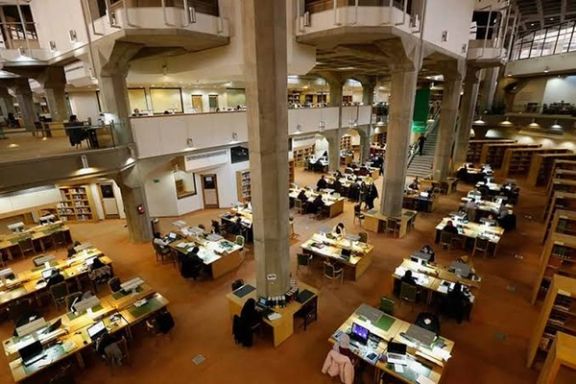
Some members of the National Library of Iran have protested the suspension of several female members for not complying with the "mandatory hijab".
In a statement Monday, they called such decisions an escalation of "gender apartheid" by the Islamic Republic.
The National Library sent text messages to a number of female members last week to inform them their membership has been suspended due to having improper hijab.
The protesting members stated that after the "baton and bullet policy", the Islamic Republic has taken a "soft removal policy" against women.
Earlier "the task of suppressing and eliminating women who oppose the mandatory hijab was carried out by the military and security forces", but now "the National Library Organization has also taken steps to exclude women,” reads the statement.
In the last few weeks, numerous reports have also been published about police sealing off businesses, restaurants, cafes and even in some cases pharmacies for not observing the mandatory hijab rules by their employees.
As street protests have ebbed, hardliner clerics and hardcore regime supporters have once again started demanding a strict enforcement of hijab rules.
The regime has already increased pressure on women for non-compliance with the mandatory hijab in a situation that the country has been the scene of nationwide protests since September 16, following the death of Mahsa Amini in police custody for not wearing ‘proper hijab’.